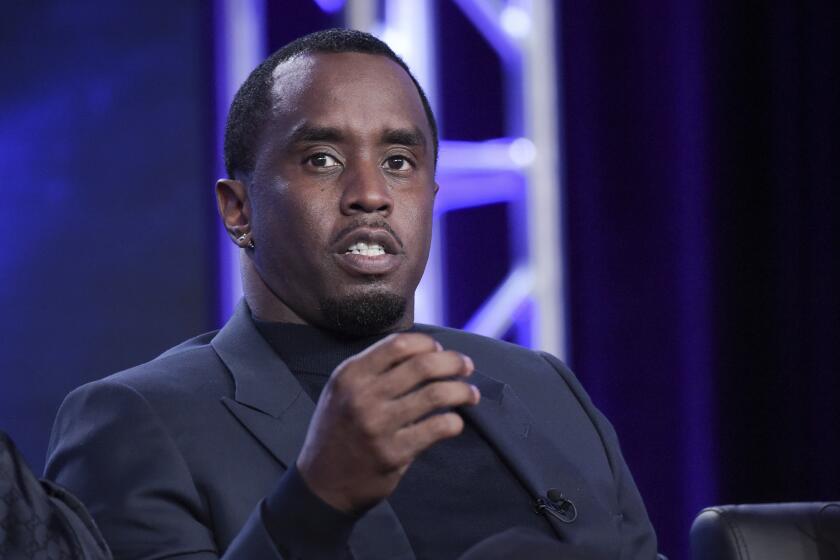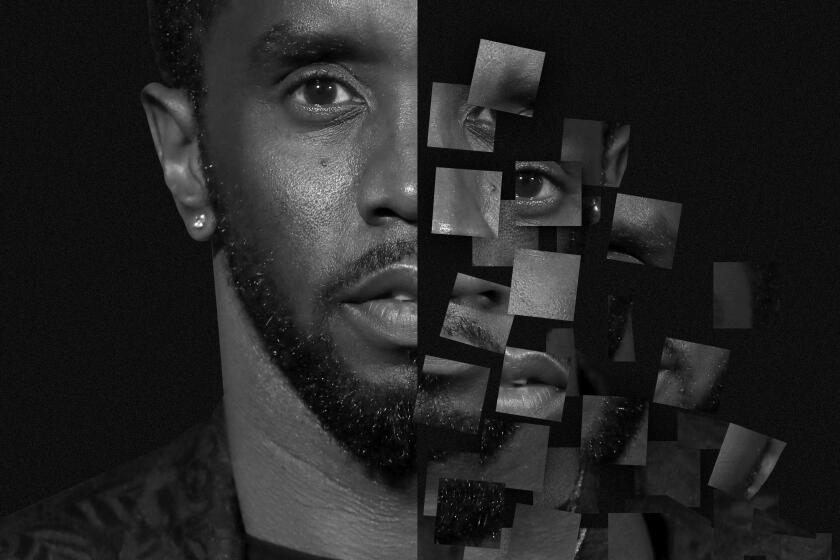‘A culture of silence and deference’: A sex trafficking expert analyzes the allegations against Sean ‘Diddy’ Combs

- Share via
The former chief of the sex trafficking unit at the Kings County district attorney’s office in Brooklyn said she was not surprised by the accusations against Sean “Diddy” Combs because the celebrity, money and power swirling in the music industry can so easily draw in people wanting to be part of the business. Lauren Hersh, now the national director of the activist group World Without Exploitation, spoke with The Times about the methods Combs is accused of using to entice and control victims, as well as the public’s changing understanding on how sex trafficking works.
On Tuesday in a federal courtroom in Manhattan, Combs pleaded not guilty to charges of sex trafficking, racketeering and transportation to engage in prostitution followed a long, high-profile investigation, including a raid on Combs’ Los Angeles and Miami homes. The indictment, announced Monday, also followed civil suits filed by Combs’ ex-girlfriend Cassie Ventura and others alleging sexual abuse and physical assault.
According to the indictment, Combs allegedly used a pattern of coercion, threats and violence to keep victims under his control. How might a relationship — romantic, musical or otherwise — turn into what prosecutors allege to be a violent sex trafficking network run by a rap celebrity?
The musician and record producer was arrested in New York months after raids on his Holmby Hills and Miami homes as part of a federal inquiry.
Most people who follow this know about the individual cases of alleged abuse involving Cassie and others. How does the indictment aim to connect several alleged incidents into a pattern of organized trafficking?
What we saw trickle out were these individual stories of individual women. For anyone who understands the complexity of these echoes, when we start seeing situations trickle out, there is often something bigger and often more organized. It didn’t come as a surprise to me that this was a complex operation, that he [allegedly] utilized his business enterprise to carry out all sorts of criminal activity ... they all fell under the broad umbrella of his business.
How might people — some of them successful musicians in their own right — get pulled into an alleged sex trafficking operation in the first place?
It’s a classic situation in that you have two things at play — a dynamic with a position of power and a position of vulnerability. Different trafficking schemes have a varying ability in terms of power. The more powerful a person is, the more that person can utilize power to prey on vulnerable people.... He [allegedly] has the ability to manipulate and deceive to create a culture of silence and deference, to bribe people into silence, to force people to conceal his conduct.
But at first, it’s very enticing for people to be in his company, to be on his payroll, to be in his hotel rooms. He has cachet that people are drawn to, he uses that mechanism to lure people in.
How does the indictment describe the ways he allegedly turned that power exchange into criminal trafficking?
What we’re seeing here is an extraordinary level of [alleged] coercion. [The indictment alleges] he plied people with drugs, he forced people to perform sex acts for days, and then would get them to comply by threatening their career. He’d record videos of sex acts, then dangle videos over people’s heads, where “If you speak or reveal anything I will disseminate this.” That’s terrifying, that’s life wrecking. There was violence, physical and sexual.
He’d have people sign NDAs and [allegedly] bribe his enablers into silence. From a legal perspective that’s an effective tool, but when you think about power and vulnerability, handing them an NDA is really intimidating, one more tool in this guy’s toolbox to [create] intimidated silence. That’s what traffickers do, utilize all sorts of mechanisms to make victims too terrified and traumatized to speak.
In the wake of multiple lawsuits filed against him, former members of Combs’ inner circle told The Times that his alleged misconduct against women goes back decades.
He’s been very effective at using NDAs over the years. Could some of the information or testimony held back by those documents emerge during a trial?
The U.S. attorney seemed to indicate this is an ongoing investigation, and very often new victims emerge. One person is encouraged to speak up, people are emboldened by survivors. There is a very good possibility other people and evidence will emerge. I wouldn’t be shocked if there is a superseding indictment with additional information. These allegations date back to 2008.
The public and prosecutors are starting to understand these kinds of cases more. The more we know about these cases, the better questions we ask, the better we do as a society to make sure of accountability. There was a really long period where there was pretty much no accountability for this guy. This is a moment of reckoning, and in building of every one of these cases, we’re more inclined to not give a free pass to the powerful. The days of impunity are over, and for the victims, that’s real.
How might victims extricate themselves? What impact might it have on them psychologically to come forward after going through an experience like that?
Cassie is an extraordinary, courageous woman. To be able to have the courage to speak her truth, that is just extraordinary. For so many victims of exploitation, recovery is a lifetime of work. The trauma is so severe. We’re talking about major psychological harm, very often physical harm, and the lifelong trauma of repeated sex abuse. It’s really hard to untangle and it requires an enormous amount of services.
We work with survivors, and very often many take ten, twenty, thirty years and they’re still untangling the trauma.
How important is this indictment for his accusers? Is it a turning point to hold someone of his status and resources criminally accountable?
With this indictment, the message is clear, that we believe you. That’s really powerful. Very likely, victims were repeatedly told, ‘Don’t speak because no one will believe you.’”
That sends a message to anybody who is thinking about an exploitative crime, that the days of the powerful operating in total impunity are over. I believe we’re in a critical moment where we’re looking at cases carefully and holding them accountable. It’s for his survivors, but every survivor too.
More to Read
The biggest entertainment stories
Get our big stories about Hollywood, film, television, music, arts, culture and more right in your inbox as soon as they publish.
You may occasionally receive promotional content from the Los Angeles Times.












